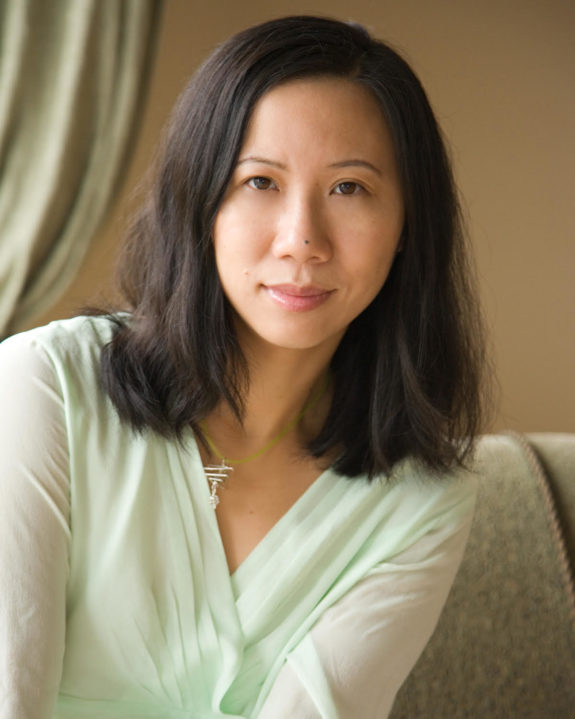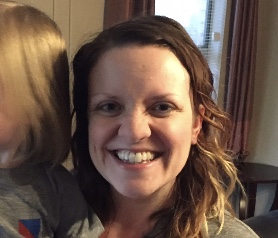Our #OwnVoices interview series continues with a writer of one of Sara’s favorite series who also shares her hometown. Sherry Thomas is the author of the “Lady Sherlock” mystery series, set in Victorian London with a female Sherlock and Watson. They spoke about strong women and the role of outsiders in her books, as well as the lead character’s love of cake.
About Sherry Thomas

USA Today bestseller Sherry Thomas is one of the most acclaimed historical romance authors writing today and a two-time RITA award winner.
The Interview
Sara Farmer: I love how Mrs. Treadles deals with the men in her office. It’s a scene that some might see as imposing modern sensibilities on the past. But I’ve learned lately that the Victorian era was much more fluid in terms of the role of women than has traditionally been thought. As the author of a series filled with strong Victorian women, can you speak to that? Has it been challenging to preserve the authenticity of the women in the series?
Sherry Thomas: Long ago, to research a historical romance set in the Northwest Frontier of the British Raj (today’s Pakistan, near where Osama Bin Laden hid out for many years), I read a travelogue written by a Victorian female big game hunter. To this day, I don’t think I’ve come across a more resolute or more opinionated person. This woman knew exactly what she wanted and did exactly what she wanted. And the best thing? Nowhere in her narrative did she ever give the impression that she was the only one of her kind, that she wasn’t “like the other women.” To the contrary, I had the feeling she knew plenty of women like her.
Now this woman was also a product of her time: casual prejudice rolled off her commentary. So while she might hold many beliefs we find abhorrent today, she didn’t have any doubts about her ability or her right to conduct her life as she wished.
I think today’s audience, especially today’s American audience, sometimes forget how deeply Victorian women of a certain class believed in their own superiority. They were definitely strong-willed, lol, bolstered by all that class privilege. They’d directed servants and other lesser beings their entire lives; they might have paid lip service to the more traditionally “feminine” virtues, but there was very little meekness in them.
This is what Mrs. Watson reminded Mrs. Treadles about, in the scene before Mrs. Treadles’s confrontation with the managers and directors of the company: the power she already had, by being the lawful owner of the enterprise. That she had the right to fire the men who ran the company.
So I’ve never found it remotely inauthentic to write strong women set in the Victorian times—hello, Irene Adler. What I do feel a twinge about, now and then, is how free my characters are from the other prejudices of their racist, colonial, homophobic, snobbish, and judgmental era. But then again, I am not writing for Victorians, but 21st century readers and so I’ve decided that they are exceptions, women of true wisdom and clarity of view who understand what’s really important and which rules and prejudices exist only to reinforce existing social hierarchies.
Sara: The cast of characters in the “Lady Sherlock” series is made up of societal “others,” even though some, like Lord Ingram, have learned to play the part. When I took a Writers’ League class with you a year ago, you mentioned that English is your second language. Did that experience inform the creation of your characters? Do you feel that your different perspective on the English language brings something special to your writing? Is there any aspect that consistently gives you trouble?
Sherry: It wasn’t until recently that I came to see how almost all my main and significant secondary characters in all my books have been others or outsiders in one sense or another. My immigrant experience must have wielded a large influence in that regard, but in fact, even before I left China, the experience of being different was already ingrained in my life. My parents were divorced when divorces were very rare. I grew up in the North of China, but my grandparents were originally from the South; my classmates were shocked that I didn’t know what yeast was since my diet was rice-based, whereas everyone else made their own steamed bread at home.
I don’t feel that I have a different perspective on the English language than anyone else. I do consistently have trouble with things such as the subjunctive tense. If you hear me speak, I’m not always on the ball when it comes to subject-verb agreement. But overall, for nearly three decades now, English has been the language in which I think. I can judge its effect on my Chinese more readily than I can gauge the other way around.
Sara: Are you similar to Charlotte? If not, is there a character you identify with?
Sherry: I love cake. I love cake and pastry and other desserts a lot. My powers of observation would impress no one, but like Charlotte I do have a cool disposition. I don’t excite easily and I don’t get anxious.
Sara: What inspired you to write a Sherlock story? How did you come up with this unique spin to set yourself apart in a market saturated with Sherlock?
Sherry: It must have been around 2005 or 2006 when I read Laurie R. King’s The Beekeeper’s Apprentice, in which a retired Sherlock Holmes takes on a young female apprentice whose brain works the exact same way his does. The Mary Russell/Sherlock Holmes books so enraptured me that for the first time in my life I thought to myself, I’d like to do something like this, to write my own take of a Sherlock Holmes story.
But I’d never written a mystery, so I put that aspiration on the backburner. Fast forward to BBC Sherlock. The first season wowed me and the desire to write my own Sherlock Holmes story came roaring back. I figured if BBC Sherlock already moved Sherlock to the 21st century and Elementary on CBS already made Watson a woman, then the only thing left to do was to make Sherlock a woman. I googled, found out that it hadn’t been done yet, and thought, well, why not me?
It helped that by the time I proposed this series to my publishing house in 2014, I’d already written a mystery. To be sure it was also a fantasy, book 2 of my YA fantasy trilogy, but its central story question was very much one of “What happened?” So, I was ready to tackle a real mystery.
Sara: The plots have become increasingly twisty and are tied to series arcs that span multiple books. How do you construct these intricate plots? How do you keep track of it all?
Sherry: Lol, I keep track by listening to all the previous books on audio before finalizing the next book. The close-linking of the stories happen, because I’m typically at a loss when I start a new book, so I look at what I’d done in the previous books to figure out where the big overall story should go.
And I’m not a natural plotter so my plots are often reverse-engineered. I don’t know exactly what should happen—I tend to have a better sense of where something does need to happen. So, I leave room for discoveries and secrets, etc., as I write my way forward, very much as if I’m a reader encountering this story for the first time, then when I finally figure the story out, I go back and patch everything together.
Writing a story is not like chiseling in marble, one mistake and your statue would forever be without an arm. It is much more like making pottery from clay: You can crunch the whole thing down and restart and you can adjust as you go.
Sara: How long did it take you to write your first novel? Do you have drawer novels?
Sherry: It took me about a year and a half to write my first novel. Years later, I would need another 10 months to tear the whole thing down and rewrite it from the ground up.
During my time as a historical romance writer, I’d already pulled out just about every drawer novel I had and rewritten them for publication. One remains. Not too long ago, I took a look at it and it was so bad I couldn’t even make it past the first page. So that one will forever stay where it belongs, in the dusty corners of my hard drive.

Sara Farmer lives in Austin, TX, with her husband, three kids, and two cats. When she’s not chasing kids and cats, she reads and writes mysteries. You can find her at www.kittymomma.com and on Twitter @avonlea79.







